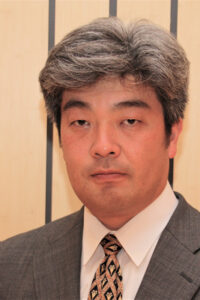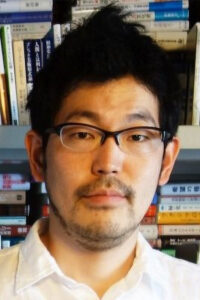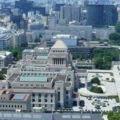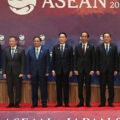Nuclear power plant treated water problem, cost of shelving
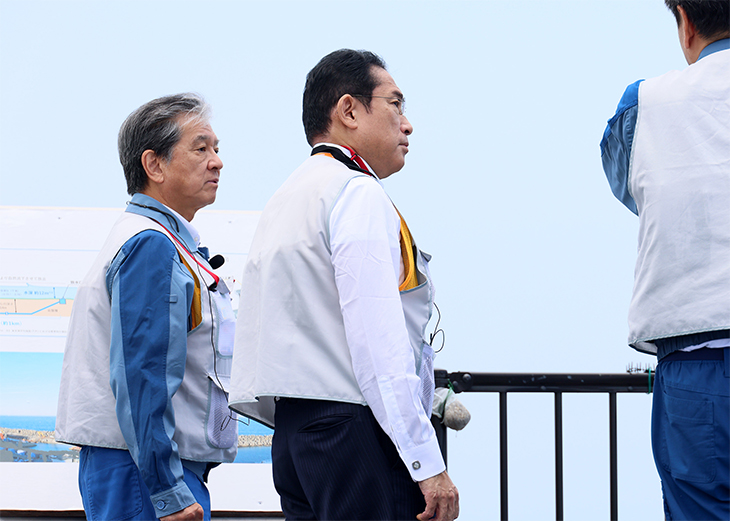
Prime Minister Kishida Fumio makes an observation tour of the facilities for discharging ALPS (Advanced Liquid Processing System) treated water into the ocean at Tokyo Electric Power Company (TEPCO)’s Fukushima Daiichi Nuclear Power Station, August 20, 2023. The release began on August 24.
Photo: Cabinet Public Affairs Office
On August 24, 2023, Advanced Liquid Processing System (ALPS) treated water was released from the Tokyo Electric Power Company (TEPCO) Fukushima Daiichi Nuclear Power Station, sparking a huge debate both domestically and internationally. A particular focus was on how to respond to China’s tough stance. However, the series of treated water releases exposed many problems in Japanese politics, society, and discourse. An international politics expert familiar with economic security and a sociologist who continues to study the Fukushima issue discuss Japan’s challenges and blind spots.
Suzuki Kazuto (Professor, Tokyo University Graduate School of Public Policy) vs Kainuma Hiroshi (Associate Professor, Interfaculty Initiative in Information Studies, Graduate School of Interdisciplinary Information Studies, The University of Tokyo)
Discourse surrounding treated water that felt very strange
Kainuma Hiroshi: I have known Professor Suzuki for about 10 years since I worked with him as a member of the Independent Investigation Commission (the Independent Investigation Commission on the Fukushima Nuclear Accident, 2011–12). What I would like to discuss today is precisely the topic of Fukushima.
On August 24, 2023, ALPS treated water stored within the premises of the Fukushima Daiichi Nuclear Power Station began to be discharged into the ocean, but some of the discourse that has been circulating under these circumstances makes me feel uncomfortable. Simply put, changes in the international economic environment and trends in political relations, which should be prerequisites, are omitted, and the only perspective is on domestic issues. Therefore, there is a “misalignment” in the discussion. I had such discomfort and concerns. That is why I wanted to speak with Professor Suzuki, who is at the forefront of the rapidly changing international politics and economic security-related issues, and who also has a wide and deep insight into the Fukushima issue.
Suzuki Kazuto: I am honored to be nominated. I don’t know if I will live up to your expectations, but I sympathize with Prof. Kainuma’s thoughts on the issue of Fukushima, so I have been looking forward to it. There has already been a lot of straight news about the background and safety of releasing treated water, so I would like to discuss a broader topic today.
Kainuma: I would like to reiterate my awareness of the problem. In fact, right after 3.11, Fukushima was treated as an international issue, with cooperation with the United States in response to the nuclear accident. Over time, this has come to be recognized as a domestic issue, and more specifically, a problem for the Ministry of Economy, Trade and Industry (METI) and the Ministry of the Environment (MOE). When treated water was released in August 2023, the Ministry of Foreign Affairs (MOFA) and others issued a message regarding its safety, and the country suddenly became involved in responding to the situation. However, I feel that this trend is converging at an astonishing speed, and there are also reports and opinions that are lacking in detail.
For example, in response to China’s tough stance after the release of treated water, a movement spread in Japan saying, “If China is like that, let’s support them by eating seafood produced in Fukushima!” However, for some time now, China has not imported seafood from Fukushima and other prefectures. Rather than ending up with such a narrow-minded discussion, we should be discussing the issue of treated water in a larger context.
The context here includes not only international perspectives but also issues facing Japanese politics and society as a whole. This time, China has used disinformation to denigrate Japan and confuse public opinion. We must think about how to deal with such “attacks.” However, if we do not realize that we have exploited the gap created by shelving the treated water problem, similar situations will likely occur in the future.
Changes in international society between 2011 and 2023
Suzuki: From an international perspective, comparing the time of the Great East Japan Earthquake to the present, relations between countries have qualitatively changed significantly over the past 12 years. Needless to say, what has changed the most is China’s movements and presence. In 2011, the issue of Fukushima was taken up in Europe, South Korea, and Taiwan, and there were strong calls for a nuclear power phase-out and restrictions on the import of foods such as those produced in Fukushima. On the other hand, China’s moves surprisingly had no noticeable impact. The current situation can be said to be the exact opposite of the current situation.
In recent years, within the framework of the US-China conflict, China has not taken any head-on measures to counter economic pressure from the US. Instead, it takes advantage of opportunities to impose economic coercion on neighboring countries such as Japan, South Korea, and Australia. The issue of treated water is strongly influenced by this context, which is probably why the reaction is much harsher than it was 12 years ago. In short, China is using the treated water issue as an international political tool.
Kainuma: As you say, China has been making various difficulties for other countries. For example, China imposed anti-dumping duties on barley and wine produced in Australia in 2020 (lifted on barley in August 2023).
China imposed restrictions on farmed salmon imports from Norway after relations deteriorated in 2010 after Liu Xiaobo won the Nobel Peace Prize. Additionally, China has implemented a ban on pineapple imports from Taiwan starting in 2021. Economically coercing other countries is not something new for them, but rather a common practice.
Suzuki: On the other hand, what is interesting is South Korea’s position, and the Yoon Suk Yeol administration is not actively speaking out this time. Not only that, but they are trying to deal with the problem of treated water using a scientific approach. You can easily imagine that the reaction would have been different if this had been the Moon Jae-in administration. Looking at these changes in South Korea, it can be seen that the issue of treated water is not only a scientific issue, but also an extremely political issue.
I believe that the reason why China made such a fuss immediately after the release of treated water was because it assumed that other countries, such as Europe and South Korea, would support China’s claims, based on what happened 12 years ago. However, in reality, both Europe and South Korea did not see any problem with the treated water, since it complied with the international safety standards of the IAEA (International Atomic Energy Agency). In fact, China’s low credibility has been highlighted by the fact that China’s discourse has been viewed with suspicion by the international community. The movements of each country perfectly reflect current international politics.
The “opportunity” created by years of shelving
Kainuma: I think it can be said that one of the characteristics of this issue is that China’s disinformation efforts within Japan have gone awry. Looking at Japanese politics, the Japanese Communist Party (JCP), which has been using the term “contaminated water,” has begun to use various theories. An atmosphere is emerging across the country that scientifically refutes the discourse that views treated water as dangerous. China, which spread false information with the aim of dividing Japan, is now in a situation where it has no advantage.
However, unfortunately, it cannot be said that this is the result of risk hedging on the Japanese side. First, I would like to look back on the movements of the Kishida Fumio administration over the past month. They must have been searching for the right time to release the treated water into the ocean for several months, but what surprised me was that it was released just two days after the decision was made. As a result, we were able to prevent it from becoming a “media event” where the release date would be reported on day after day. Also, regarding the issue of treated water, it is worthy of praise that politics was able to take a front seat and fulfill its responsibility without imposing the position of pressing the switch [on ocean discharge] on the fishermen involved.
On the other hand, from a medium- to long-term perspective, all experts involved in the issue of treated water recommended that it be addressed as soon as possible. Nevertheless, the former Abe Shinzo administration continued to shelve the issue. It is precisely because such a long period of time has passed that a situation of “looseness” has arisen, and various fake news have been spread both domestically and internationally. China’s strong criticism of Japan is essentially the result of the Japanese government’s continued reservation of judgment.
Suzuki: Regarding the issue of the Fukushima nuclear accident, I felt that the Abe administration was trying to dismiss it as the negative legacy of the Democratic Party of Japan (DPJ) administration. Until his resignation in the summer of 2020, [the Fukushima nuclear accident] rarely made headlines. The water problem was also left untreated as there was still time. It is a common pattern in Japanese politics that policy decisions are not made until the situation becomes critical. As a result of this neglect, various contradictions and gaps have arisen. This time, China has targeted us on this point.
I was asked for advice in advance by the concerned parties regarding the release of treated water, and I advised that if it was desirable to release the water into the ocean based on scientific knowledge, the IAEA should definitely intervene. If you don’t involve a third party, it will be difficult to deal with when a foreign country tries to intervene. Because Kasumigaseki [government ministries] is always busy dealing with day-to-day issues, there is a significant lack of imagination for medium- to long-term risks. Therefore, outsiders like us should compensate for this by proposing the need for permanent preparations from a big-picture perspective.
Kainuma: Regarding this point, as someone who has continued to study Fukushima, I am now aware of this and have also reflected on the fact that my international political perspective is insufficient. To be honest, China’s attitude exceeded my expectations.
Treated water problem used for politics
Suzuki: Another thing I’m concerned about is the distortion of discourse spaces. You mentioned earlier that the JCP has been using the term “contaminated water.” After all, [the JCP] is fine with any terminology as long as it can attack the current regime.
This is actually a concept that can also be applied to reactions to China. In other words, this time China has strongly criticized the issue in an anti-scientific manner. That is why public opinion in Japan has shifted away from the issue of treated water itself and has focused on “against China.” In other words, whether the other party is the government or China, discussions are proceeding at the level of politics and diplomacy that have nothing to do with treated water. Of course, as I have talked about today, it is essential to approach the Fukushima issue from an international political perspective and from a security perspective in a broader sense. Isn’t it unsound to unite as a nation only under the banner of “against China” or to use the treated water problem politically from the perspective of “against the government”?
Kainuma: This is an important point. For example, in a public opinion poll conducted by the Japanese news agency Jiji Press in September, 52.9% were in favor of releasing treated water, while 16.3% (Can’t say/don’t know 30.8%) were against it, a difference that is well over a double score. It is true that the Japanese government has been working to promote understanding since the beginning of this year, and politicians such as Nishimura Yasutoshi, Minister of Economy, Trade and Industry, have made public appearances to emphasize safety, which may have been a success.
However, it cannot be denied that the poll numbers fluctuated due to accidental factors such as China’s response. In fact, a Jiji Press poll in July showed that 39.2% were in favor of the idea and 28.0% were against it, which is not as big as it is now. Until 2022, there were many poll results that were either overwhelmingly opposed or evenly supported. If he had made one mistake, he would not have been able to withstand the external pressure, so it cannot be said that it is highly likely that he will be able to reproduce it. Behind this instability is the distortion of discourse spaces as you pointed out. However, as a short-term response by the Japanese government, MOFA in particular should be praised for its more proactive communication than ever before.
Suzuki: The reason why MOFA was able to take such an aggressive attitude is probably due to the influence of the Russia-Ukraine war. In the war since 2022, for example, Russia claimed that the Bucha massacre was the work of the Ukrainian military. As the United States disproved this by citing intelligence, the recognition that authoritarian countries make full use of disinformation has spread around the world. In that sense, the Russia-Ukraine war can be pointed out as an important turning point in information warfare in international politics.
Japan’s MOFA must have learned from witnessing the information war between the United States and Russia, and recognized China’s recent behavior as part of disinformation, and countered it. I believe that the government’s response was probably reflected in the public opinion polls as a side effect.
However, they have surfaced at the same time. The issue is that if China dares to question treated water, which is inherently safe, what about the domestic opposition parties and some liberal reformists who were criticizing the government for the same “setting”? Based on this logic, the anti-base movement in Okinawa and the discourse of “not allowing Abe politics” during the Abe administration can be rewritten in the context of disinformation. Any such discourse could be considered imported from China.
While it is true that we cannot completely deny this aspect, we cannot help but be concerned that this atmosphere is going too far. This is because if you do not approve of the current government, you risk being labeled as a “pro-China” faction. This time, it happened to be a positive thing, but the Japanese government has not been able to control this mood, which even gives off a sense of fear.
Nowadays, even China cannot control public opinion
Kainuma: In that respect, this time was an opportunity for us to realize once again that China is also living in an era where it is no longer possible to control the atmosphere of society. Graduate students in my laboratory are currently diligently observing Chinese social media and researching what is being said there. This is really interesting. China has completely suspended imports of Japanese seafood. For example, scallops, which were most commonly imported, are served to local consumers at high-end restaurants where the average cost per customer is over 20,000 yen, so many people have no contact with them. As a result, for some reason, the popular energy is missing the point, such as boycotting salt and candy, and what’s more, there are movements based on false rumors.
As is well known, anti-Japanese demonstrations in the past were controlled by the government, but now Chinese authorities are no longer able to fully control the movements of the people. On the other hand, it is harder for Japan to predict the movements of public opinion in China than ever before, so it will need to revise its strategy on how to deal with it. It is predicted that the number of problems that will be difficult to deal with both politically and scientifically will continue to increase.
Suzuki: The random “prank calls” made to Japan from China were probably an expression of irregular popular energy. The reason why the situation has calmed down compared to before is probably because the government managed to put out the fire. In fact, the Chinese government believes that the issue of treated water should not be escalated any further. Japan was strongly criticized at the United Nations Security Council’s emergency meeting held on August 25th by China, but it was not mentioned at the East Asia Summit (EAS) held on September 7th. This is not only because Japan’s disinformation measures were successful, but also because, as I said earlier, the international community, including Europe and South Korea, unexpectedly did not go along with China.
Literacy necessary in the era of economic security
Kainuma: I think Japan’s big challenge going forward is to foster so-called mass literacy. As I mentioned at the beginning, for example, China has not been importing Fukushima marine products [since April 2011]. Despite this, the discourse of “Let’s support Fukushima by eating it!” became popular in Japan. If you know even a little bit about the background, you’ll understand that this is a countermeasure that deviates from the essence, but that perspective is not even presented in the media.
This time, the government responded appropriately in the short term, and the international battle of public opinion with China was successful. However, the next time something happens, there is no guarantee that we will be able to survive with just a simple worldview or prerequisite knowledge, such as being “anti-China.” In fact, there may be a greater risk that China will attack us on these points.
Furthermore, from August 1, the Chinese government has instituted export restrictions on the rare metals gallium and germanium, which are used as materials for semiconductors. Prof. Suzuki also pointed out on X (formerly Twitter) that we should be aware that the treated water problem is occurring in parallel with such issues. China has been developing wolf warrior diplomacy for some time, but we cannot get close to the essence of China’s movements without considering the economic security perspective, and our discussion will be flimsy.
Suzuki: The purpose of China’s disinformation is to change the other party’s policy by inflicting economic damage. This is truly an economic security measure, an attempt to impose economic coercion on Japan and achieve the policies China desires. In this case, the doubts about the safety of treated water are only superficial, and the aim is to corner Japanese fishermen who depend on exports to China and put pressure on the Japanese government. In response, the Japanese government will provide approximately 30 billion yen for providing marine products to corporate cafeterias and public relations activities as a countermeasure against reputational damage, and approximately 50 billion yen for continued support for fisheries. The government is planning to do its best to support fishermen by utilizing each fund.
It is precisely because China has so blatantly attempted economic coercion that the Japanese government and public opinion have been able to perceive it as an intentional attack by China and apply it to the framework of economic security. Still, when it comes to specifics, I think that the fact that people are reduced to the level of “eating Fukushima food and supporting it” as you introduced means that Japanese people have not yet developed the literacy to grasp the essence of the problem. In other words, although we were able to determine whether or not China was attacking us, we were unable to understand our own vulnerability. It is a very dangerous situation, because they do not know what points of other countries are attacking and where they should defend themselves.
Kainuma: In the past, in conflicts between nations, it was only a matter of specifics about how many missiles and other weapons each side had and where their bases were located. However, in the age of economic security, things are not that simple, and we need to use our imagination to hedge risks.
Suzuki: In terms of literacy, the first step is to be aware of our strengths and weaknesses. When rare earths were banned from being exported to Japan in 2010, it became clear that Japan was dependent on China. This time as well, I wonder how many people other than fishermen and people at the Ministry of Agriculture, Forestry and Fisheries knew that so many Japanese seafood products were being exported to China. What’s more, even if you know about it, preparing for the risks is another story.
We should be very aware of what we are relying on and which countries we are relying on, and keep in mind the risk scenario in the event of a contingency. That is what I define as economic security. This time, although we may have been able to deal with China’s disinformation to some extent, we were not able to adequately deal with economic vulnerability. From my perspective as someone who studies geoeconomics and economic security, I would say that if exports are biased towards a particular country, we should create multiple scenarios of what problems will arise when the market closes.
Future actions required of the Japanese government
Kainuma: Considering future developments, the focus will first be on whether China or Hong Kong will continue to take a tough stance. Regarding domestic issues, efforts must be made to avoid causing so-called reputational damage.
Reputational damage consists of two elements: “reduction in consumption due to consumers avoiding products and visits,” and “fixation of price declines amidst changes in the distribution structure” due to prolonged damage. In other words, it consists of two issues: needs and price. Normally, needs are lowered by image, but in this case they were lowered by actual international interests. It should be recognized that we have entered a new stage that is discontinuous with the previous reputational damage. The Japanese government’s long-standing problem that lies behind this issue should be reconsidered.
The future responsibility of the Japanese government is to increase domestic consumption of Japanese seafood and adjust alternative export destinations to minimize the impact on prices. This is a phase in which political power is tested. However, we should also refrain from overreacting. As mentioned above, scallops, which are often exported to China, are consumed as a luxury item, and it is only in the past 10 years that consumption has suddenly increased in China and emerging countries. The Japanese government must maintain a medium- to long-term perspective and not summarize everything that will happen in the future by saying, “This is reputational damage, and it is important to explain and promote understanding domestically.” In other words, it is important in risk control not to try to solve problems using only conventional methods. An economic security perspective is also essential.
Suzuki: One of the words used in discussions of international interdependence in international politics is “sensitivity.” “Sensitivity” is defined as whether or not the degree of impact is large when an unexpected external event such as a war or natural disaster occurs. The ability to recover quickly or slowly after receiving damage is defined as “vulnerability.”
I think this distinction is helpful. For example, it can’t be helped that you have sensitive areas. As long as we trade in a global economy, there is a possibility that the other party will suddenly stop buying our products, and if we were concerned about that, we would not be able to do business. However, we should be able to imagine the risk that we will no longer be imported, and unforeseen situations are bound to occur in the future. The important thing is to be prepared to recover when that happens. In order to reduce vulnerability, we need to be imaginative about risks, but in my view this is an area where Japan is quite weak and this is a challenge.
Kainuma: What is your outlook on the future of the treated water issue?
Suzuki: Looking at past examples such as BSE (bovine spongiform encephalopathy) in the early 2000s, food safety and health problems tend to last for a surprisingly long time. It has been 20 years since mad cow disease broke out in the United States, and in Japan, major gyudon (beef bowl) chains used large amounts of it as an ingredient in their gyudon dishes. In 2005, we resumed importing animals under 20 months of age, and in 2013 we resumed importing animals under 30 months of age (Complete removal of import restrictions will occur in 2019). However, since China does not have a solid incentive, there is no need to change its policy, and it was in September 2016 that it announced that it would partially lift the import ban.
If we are thinking of exporting Japanese marine products to China again, we need to think about how to give the other party an incentive to lift restrictions. However, no matter how much Japan tries to encourage people to do so, it is difficult to imagine that a mood will be created for people to eat luxury items such as scallops, especially now that China’s economy is in decline. There is a high possibility that the current situation will be prolonged. However, considering fishermen, it is important to consider how to approach China’s consumer society, and this is a major issue that the Japanese government must solve.
Kainuma: It makes me nod. I would like to take this opportunity to speak from a broader perspective. Keywords such as “disinformation” and “literacy” came up in today’s conversation, and in fact, 3.11 12 years ago was ahead of the curve on many issues, including these issues. The Fukushima issue has been a fake news and post-truth politics issue from the beginning. However, it was about five years later that it became a global topic. If so, there is no doubt that there is much to be gained by refocusing our attention on the issue of Fukushima. As a Fukushima researcher, I would like to say this.
And there is the concern about vulnerability that Prof. Suzuki emphasized. For example, in Fukushima, METI manages the nuclear power plant premises, but MOE has jurisdiction over the monitoring of treated water. Japan is becoming increasingly vertically divided in many fields, and this can also create vulnerabilities. It is too late to wait until a crisis approaches and things are on fire, so quickly sorting out the issues that have been shelved so far will move Japan closer to becoming a country that is resilient to risks.
Moderated by Mizushima Ryusuke, PHP Institute
Translated from “Genpatsu-shorisui Mondai, Tanaage no tsuke (The cost of shelving the nuclear power plant water issue),” Voice, November 2023, pp. 16–27. (Courtesy of PHP Institute) [December 2023]
Keywords
- Suzuki Kazuto
- Tokyo University Graduate School of Public Policy
- Institute of Geoeconomics
- International House of Japan
- Kainuma Hiroshi
- Graduate School of Interdisciplinary Information Studies
- The Great East Japan Earthquake and Nuclear Disaster Memorial Museum
- ALPS treated water
- Fukushima
- nuclear power plant
- nuclear accident
- China
- economic security
- risk control
- seafood
- marine products
- import ban
- reputational damage
- economic coercing
- politics
- policy decisions
- shelving issues
- fake news
- Russia-Ukraine
- disinformation
- information war
- public opinion
- sensitivity
- vulnerability
- literacy
